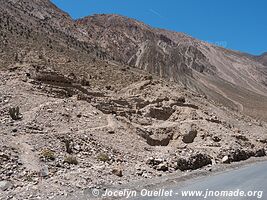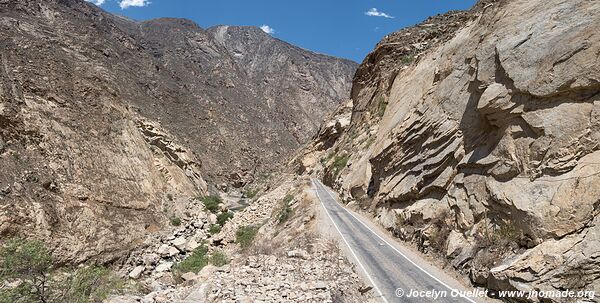Driving magnificent canyons
In the region I am about to visit, the most famous canyon is Cañon del Pato or, in English, Canyon of the Duck. However, before reaching that canyon, I drove through an area that was no less spectacular with canyons and mountain landscapes.
The itinerary I am showing you in the next three sections extends over a distance of 120 kilometres of winding, narrow and sometimes dangerous roads.
Tablachaca River Canyon
The archeological site La Galgada is far from being the most impressive. However, taking into account the fact that the site is dated from 2400 to 2000 BC, it is surprising to still be able to see some parts of the structures (even with some restoration).
The site was built according to the Kotosh Religious Tradition, a term encompassing the structures built in the Andes from 3000 to 1800 BC. The period is anterior to the ceramic era (pottery).
Santa River Canyon
Small and quiet campsite near the road and the river, but hidden from sight.
The night was very quiet and I slept very well with the sound of the river flowing only a few metres from my site.
Small mining operation to extract coal.
Coal is collected by hand, then transferred to the truck using the conveyor belt hanging above the river.
How to get air conditioning with a motorbike?
Very simple: take a quick shower with all your clothes, and you get cooled down for almost one hour. Yes, it doesn't last long under the sun and wind.
Cañon del Pato
The Cañon del Pato separates two imposing mountain ranges, the Cordillera Blanca and the Cordillera Negra.
It's here that the cliffs are nearest to each other. At some points, the top of a cliff can be nearly 1000 metres above your head.
In this canyon, you cross more than 54 tunnels often carved directly in the rock. You need to be careful and honk generously since there are several trucks driving this road at speeds sometimes surprising.
The narrowest place between the Cordillera Blanca and the Cordillera Negra.
I am getting close to where the two cordilleras are almost touching each other. It's an impressive place, but it is difficult to give it justice with photos.
At the narrowest place, the two cordilleras are only 6 metres apart, and the sheer cliffs have more than 1000 metres in height.





















































































